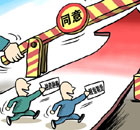Op-Ed Contributors
Spell out crackdown on pornographic texts
By Yan Yang (China Daily)
Updated: 2010-01-26 07:50
 |
Large Medium Small |
Recent news that authorities in Beijing, Shanghai and the southern city of Guangzhou will suspend the text-messaging function on cell phones allegedly used to transmit pornographic content has created heated debates in various social circles.
Due to the lack of specific definitions of pornographic texts, some cell-phone users, even a few celebrities, have reportedly transmitted porn content to see if they could try to challenge the monitoring network.
| ||||
It is reported that Beijing Unicom and Beijing Telecom, two other major mobile phone operators, will make similar moves.
So far, no unified standards have been established to define pornographic messages and what is considered safe content. And no unified measures have been taken to punish alleged violators.
Compared with Beijing Mobile, cellular companies in Shanghai and Guangzhou are seemingly more resolved to impose much harsher measures to curb pornographic text messages. Authorities in the two regions said that the text messaging function on cell phones would be immediately suspended if they were caught transmitting porn messages.
Violators will have to apply with the local public security departments to resume their suspended service and they have to sign a written document guaranteeing that they will not make similar offenses in the future. Compared with their counterparts in Shanghai and Guangzhou, Beijing Mobile is more prudent in meting out punitive measures to violators.
Public opinion has remained widely divided on the recent government campaign against cell-phone pornography. On the one hand, the public has given its firm support to the severe crackdown by State departments and cellular providers on the dissemination of pornographic messages aimed at making a profit.
But they also believe that the transmission of pornographic messages between ordinary cell-phone users should not be controlled and no punitive measures should be given.
Beijing Mobile has discerned which cell-phone users are transmitting small volumes of porn texts from those who aim to seek exorbitant profits by transmitting large volumes of banned messages. It has also set different standards on people who receive porn messages passively from those who receive them voluntarily.
While it has inflicted harsh crackdowns on profit-seeking transmissions of porn messages, Beijing Mobile has tried not to interfere with occasional text messages between those who are trying to get to know each other to ensure that their right of communication is not restricted.
Beijing Mobile's specific preconditions for the suspension of the text messaging function are in line with legal and justified procedures. Cell-phone services providers, which are not a law enforcement agency, has formed a relationship with phone users through contracts and are legally bound to provide them with unblocked communication services and are not empowered to suspend the text-messaging function as a punitive measure.
To facilitate the country's campaign against porn dissemination, cell-phone providers should be cooperative, but any measures should be based on the law. When suspected text messages are monitored, cellular providers should transfer them to the local public security department. If the texts are confirmed as pornographic, the public security agency will issue an order to cell-phone operators, telling them to suspend the texting function and notify users in a timely manner.
Anti-porn controversies in society indicate that relevant State departments should reflect on the campaign. Officials should wonder why news of the text-message crackdown has mostly come from individual media outlets instead of official channels. Why does the public fail to hear an authoritative explanation from the competent State department when the news has riled up the public?
The public has only heard minor explanations from cell-phone providers. State departments still remain elusive in determining which key words should be monitored and whether the monitoring will constitute intrusion into the privacy of cell-phone users.
To make the campaign against cell-phone porn more effective, the public should be informed of the basic standards of porn-messages and key words wthin porn messages that will raise a warning. Assurances should also be offered to the public that the government campaign against cell-phone porn messages will not intrude upon their privacy.
The author is a media commentator and the article was originally carried on Changjiang Daily.
(China Daily 01/26/2010 page8)












